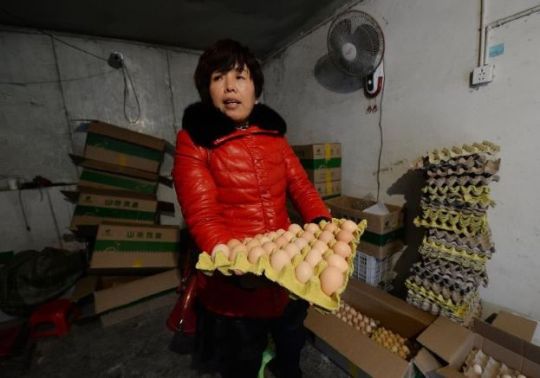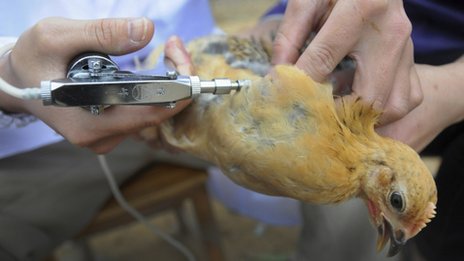H7N9 bird flu comes home to roost in China

A woman with organic eggs that she is banned from selling at a market closed due to an outbreak of H7N9 bird flu in Hangzhou, Zhejiang Province, February 17, 2014 – by Mark Ralston
The handful of poultry dealers lingering at Chengbei Market have had little to do since Chinese authorities shut down their livelihoods after H7N9 bird flu began stalking the country again, killing scores of people this year.
They spend their days counting the losses to their business, gambling at cards and cleaning the cages which once held thousands of live birds, hoping the government will allow the trade to resume.
“The chickens lay every day and I can’t sell the eggs. We are losing money,” said Li Guiying, local boss of the Xuancheng Shandi Poultry Co.
H7N9 avian influenza has returned to China with a vengeance, sickening 226 people and killing 72 so far this year, as the government girds for what is likely to be a long battle to contain what one World Health Organization (WHO) official has labelled an “epidemic”.
China has responded by aggressively closing down poultry markets in locations believed to be at threat from the virus, raising an outcry from the agricultural industry and consumers with a taste for freshly slaughtered food.
But in the longer term the government needs to encourage a shift in behaviour of consumers and clean up the nation’s food supply chain, experts say, which has been hit by a series of health safety scandals.
Ultimately, fears exist that the H7N9 virus could mutate and become easily passed between people, rampaging through the world’s most populous country and crossing its borders to spread around the planet.
After subsiding following the first outbreak early last year, H7N9 resurfaced in the autumn, then boomed. The figures for the first two months of the year exceed the tallies of 144 infections and 46 deaths for the whole of 2013.
The WHO and Chinese authorities maintain there is no evidence of “sustained” human transmission with H7N9, though there have been cases of family members in close contact infecting each other.
But they acknowledge a seasonal spike in cases, possibly caused by the affinity of the virus for colder temperatures and humans’ greater susceptibility to illness in winter.
“The big question always is, ‘does it go down as the season goes away or does it continue?'” said the WHO Representative in China, Bernhard Schwartländer.
“We seem to start seeing a decrease again, which confirms the seasonal patterns, but there is of course no reason and no space to relax,” he said.
– ‘Chickens can’t talk’ –
Poultry dealers accuse the government of shutting the markets without scientific evidence and demand compensation for the birds they were forced to slaughter or sell at rock-bottom prices.
“Chickens can’t talk. Ducks can’t talk. We don’t know where bird flu came from: chickens, ducks or other birds,” said Li, at the Chengbei market in Hangzhou.
Authorities in the city, capital of the eastern province of Zhejiang, the centre of the current outbreak, shut down the market in January. The province has announced radical plans to ban — forever — all live poultry trading in urban areas, according to state media, and replace it with factory-slaughtered and frozen meat.
China’s National Poultry Industry Association estimates the sector has lost more than $3.0 billion so far this year, on top of the impact of the outbreak last year as consumers shunned fowl and markets stopped business.
“Within the industry we call it a devastating hit, a crowning calamity. With our backs to the wall, it seems one cannot adequately depict the severity of the situation,” said the association’s secretary general Gong Guifen.
“The selling of frozen chicken is more like an emergency response, whereas the industry as well as the public’s consumption habits cannot be changed overnight,” she said.
But poultry market closures were the most important measure to contain the virus, said WHO’s Regional Director for the Western Pacific Shin Young-soo.
“Of course, I think the Chinese government should consider many other things. This has a huge impact on our daily life… on farmers, market people,” he said.
In contrast to H5N1, a different strain of avian influenza which affected China earlier, H7N9 is harder to detect because it does not kill the birds that can pass it to humans, he pointed out.
“H7N9 is more difficult because actually the bird and ducks, they’re… not really sick. It’s more difficult to control,” he said.
“It’s very fatal to human beings,” he added. “We know that this virus (is) never going again. It’s coming back.”







